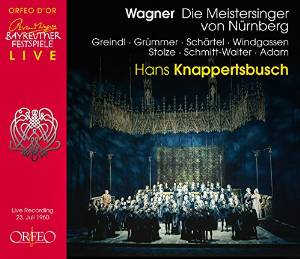WAGNER Die Meistersinger von Nürnberg
View record and artist detailsRecord and Artist Details
Composer or Director: Richard Wagner
Genre:
Opera
Label: Orfeo
Magazine Review Date: 12/2015
Media Format: CD or Download
Media Runtime: 280
Mastering:
DDD
Catalogue Number: C917 154L

Tracks:
| Composition | Artist Credit |
|---|---|
| (Die) Meistersinger von Nürnberg, '(The) Masters |
Richard Wagner, Composer
Bayreuth Festival Chorus Bayreuth Festival Orchestra Donald Bell, Nightwatchman, Bass Egmont Koch, Nachtigall, Bass Elisabeth Grümmer, Eva; Pogner's Daughter, Soprano Elisabeth Schärtel, Magdalena, Mezzo soprano Eugen Fuchs, Foltz, Bass Frithjof Sentpaul, Ortel, Bass Gerhard Stolze, David, Tenor Hans Günter Nöcker, Schwarz, Bass Hans Knappertsbusch, Conductor Harald Neukirch, Eisslinger, Tenor Heinz-Günther Zimmermann, Zorn, Tenor Hermann Winkler, Moser, Tenor Josef Greindl, Hans Sachs, Bass Karl Schmitt-Walter, Beckmesser, Baritone Ludwig Weber, Kothner, Baritone Richard Wagner, Composer Theo Adam, Pogner, Bass Wilfried Krüger, Vogelsang, Tenor Wolfgang Windgassen, Walther, Tenor |
Author: Mike Ashman
There are certainly some surprises here. In Act 3 a good minute is taken off most other maestros’ tempi for the Prelude (two off the old Decca recording), a good half-minute from the Quintet. The dances are real funfair stuff, bright and chirrupy, while the philosophical grass certainly doesn’t grow under the feet of Greindl’s bass Sachs in his two serious monologues. And the adventurous discordances of the Act 2 ‘riot’ music – both when first heard and quoted when Beckmesser revisits Sachs in Act 3 – are clearer (and better delivered) than in many rival versions. That said, the very steady tread at which the whole ‘riot’ ensemble is launched will not be for everyone – and isn’t for everyone onstage on this occasion in terms of pinpoint ensemble. In the middle of all this, Canadian Donald Bell is a subtly amusing Nightwatchman.
Josef Greindl, already established in the Festival’s ‘baddy’ roles, makes the transition to Sachs comfortably. However, he sounds a mite too dark and gruff giving out marching orders for departure for the Festival Meadow, or ‘Jerum! Jerum!’ – where the comedy of embarrassing Beckmesser overtakes the hints to Eva that Tomlinson (and Hotter and Norman Bailey) work into their performance. Among his fellow masters, Ludwig Weber is entertaining as Kothner sending up the pomposity of the Guild’s rules, and Theo Adam is mannered while not inappropriately young as Pogner, but Karl-Schmitt Walter’s Beckmesser comes across as penny-plain and straightforward. Elisabeth Grümmer (on instruction from conductor or stage director?) sounds as if she is trying to sound younger and more soubrettish than she naturally was – in fact more like Hilde Gueden, Knappertsbusch’s first Eva on record. Stolze, without any of the vocal over-acting assumed for his contemporary Decca recordings, is a fluent and natural David. Wolfgang Windgassen’s evident intelligence as the hero is unfortunately rarely matched by the beauty of tone one wants from a Walther.
The sound of this latest reissue is adequate for its period and source but it’s hardly a revelatory resurrection. The booklet messes up the track-listing of Act 2. Pace past reviews of this performance, you may find, this is certainly neither ‘the slowest Meistersinger ever’ nor Knappertsbusch’s ‘worst ever’ Wagner performance. Its main interest remains the curiosity value of hearing him conduct it, but I wonder why Orfeo did not choose the production’s 1956 Cluytens/Hotter first night and whether the company will risk the intriguing 1963 Schippers/Silja/Thomas version, Wieland’s next Bayreuth opening.
Discover the world's largest classical music catalogue with Presto Music.

Gramophone Digital Club
- Digital Edition
- Digital Archive
- Reviews Database
- Full website access
From £8.75 / month
Subscribe
Gramophone Full Club
- Print Edition
- Digital Edition
- Digital Archive
- Reviews Database
- Full website access
From £11.00 / month
Subscribe
If you are a library, university or other organisation that would be interested in an institutional subscription to Gramophone please click here for further information.




